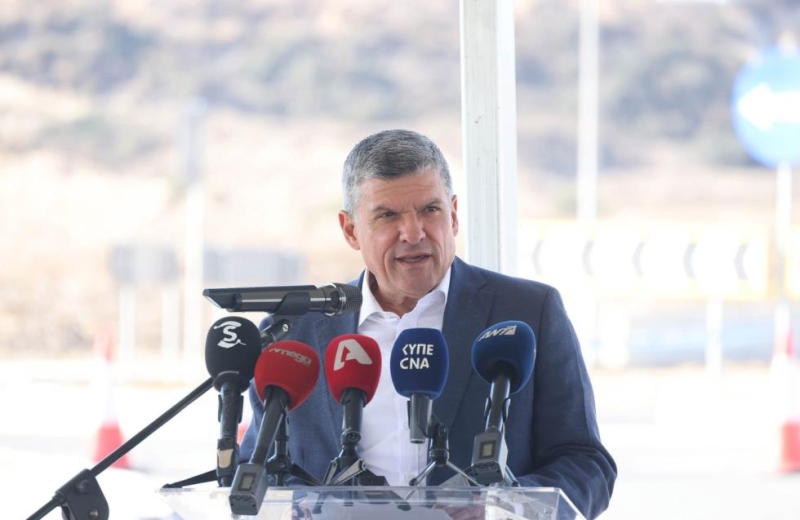
The aim is to reduce the cost of electricity, said Energy Minister Giorgos Papanastasiou
The import of natural gas, the expansion of the use of renewable energy sources and the electrical interconnection with neighboring countries are the main pillars of the Government's energy policy, said the Minister of Trade, Energy and Industry Giorgos Papanastasiou in his greeting during the working breakfast with the theme ” Presentation of Incentives to Businesses for a Sustainable Development”, which was organized on Monday in Nicosia by the All-Cyprus Association of Energy Saving Businesses in collaboration with Ernst & Young and the Bank of Cyprus, under the auspices of the Minister of Energy.
According to Mr. Papanastasiou, the state attaches great importance to the policies implemented with the aim of the country's faster transition to the Green Economy, aiming both at achieving the national goals for energy, and at strengthening the competitiveness of businesses, reducing energy costs of all consumers, the strengthening of security, energy supply, the lifting of energy isolation of Cyprus, the creation of the competitive internal electricity market and the functioning of the internal natural gas market.
He added that the Ministry is working to complete the revision of the national energy and climate plan, which he said includes all the measures and policies with which Cyprus will achieve its new goals by 2030, and the which is expected to be completed next month, with a particular emphasis on promoting energy efficiency investments in all sectors.
He added that the Ministry's main actions in the current period include a number of targeted grant schemes, which will be mostly financed by the EU's Recovery and Resilience Mechanism and the THALEIA 2021-2027 program, such as the grant scheme for energy upgrading and strengthening the competitiveness of large businesses with a total budget of 17 million euros, the sponsorship plan for the circular economy in small and medium-sized businesses with a total budget of 14.4 million euros and the second announcement of the “Save-Upgrade” plan for small and medium-sized businesses and non-profit organizations with a total budget of 20 million euros.
Mr. Papanastasiou also made a brief reference to the Ministry's plans for the coming months and years, noting that the goal is to reduce the cost of electricity on the basis of three of pillars.
The first pillar, according to the Minister, is the immediate need to import natural gas in liquefied form through the terminal under construction, which he characterized as a project of exceptional value for the implementation of the above pillar, despite its increased cost, as it will significantly reduce the pollution and consequently the cost of electricity generation, with the second pillar relating to RES with the creation of photovoltaic parks, the energy autonomy of homes and businesses and strengthening the network with energy storage provided by RES, while the third pillar concerns in the electrical interconnection with neighboring countries, which, as he mentioned, involves both a geopolitical dimension and that of security of supply.
He added that in order to have the benefits expected by consumers, the first two pillars should be combined with the competitive electricity market, which will be implemented by July 2025.
“The pressure that Europe is putting on green technologies is taking its toll on itself, making its economy and industry no longer competitive, which the EU realizes and has corrected through positions to to enable the green transition to be more sustainable”, noted Mr. Papanastasiou, adding that in his personal opinion, green technology should coexist with natural gas technology.
The Deputy Director of the Environment Department Lakis Mesimeris referred to his own welcome to the European Green Deal, the aim of which, he said, is to achieve climate neutrality by 2050, and to the package of 15 legislative proposals “Fit for 55” covering all sectors of the economy and will lead to a more competitive economy.
Among the above proposals, he focused on the greenhouse gas emissions trading system, which since 2005, he said, has produced excellent results, with energy-intensive industries at EU level to have managed through carbon pricing to find alternatives that led to clean technologies, energy savings and a 47% reduction in emissions.
For Cyprus in particular, he said that the non-utilization of the above tool burdened the economy, citing for example that 30% of the operating costs of the hotel industry are related to the cost of electricity and degrades the competitiveness of the sector.
“If we fail to find the beneficial approach to this tool, we will further condemn anything related to the competitiveness of the economy and there will be an additional headache for the achievement of national goals,” he noted, adding that if we want to see solutions regarding with the national goals and the utilization of the institutional tools, we should start from saving energy and the Department of the Environment will support every action in this direction.
Finally, the president of the All-Cyprus Association of Energy Saving Businesses Giorgos Georgiou he said for his part that Cyprus has set ambitious goals for the effort to deal with climate change, including reducing greenhouse gas emissions by 32% by 2030 and increasing the percentage of RES in final energy consumption to 33% .
He also emphasized that the saving and rational use of energy is the only means to achieve the goals of the European energy policy, but also to ensure the energy sufficiency of the country, and that the improvement of energy efficiency in buildings and businesses reduces operating costs.




